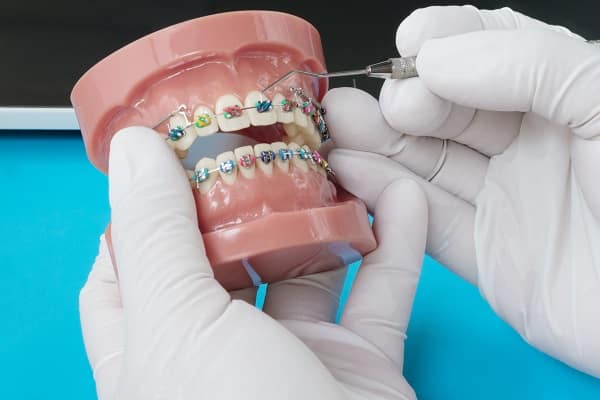
You’ve decided you want braces and your dentist has offered to provide them. You may wonder, “is there any difference between a dentist and an orthodontist?” There is a difference, and it comes down to training and education, as well as experience. You may have been offered a low braces’ price by a non-orthodontic specialist, but read below to learn more about all of the factors to consider (including cost). You should consider the quality of the results and your lifelong smile above all else.
Orthodontist vs. Dentist: What’s the Difference?
An orthodontist has received specialized training focused on the bite, and the positioning of teeth and jaws – that is the definitive difference. Dentists and orthodontists also share several qualifications. Both doctors:
- Graduate from dental school
- Treat teeth and oral health issues
- Offer professional services focused on improving your dental health
The services of your dentist and orthodontist are complementary. Together, your orthodontist and dentist will make sure you have a healthy, beautiful smile. The hygienists at your dentist’s office will know how to clean around your wires and brackets while you are completing treatment, so you’ll still be able to get your routine cleanings and checkups.
How a Dentist Becomes a Specialist
Orthodontists are specialists of the bite, which includes how the upper and lower teeth come together. It also covers the position of the teeth within the jaw, the alignment of the teeth, and the position of the upper and lower jaws. To become a specialist in a dental discipline, a dentist continues their education after dental school. Then they attend an accredited program focused in their chosen specialty, which takes two or more years to complete. Once the specialty program is completed by the dentist, they can use the name to designate their specialization, i.e. “orthodontist.”
Although dentists who are not orthodontic specialists are legally allowed to provide Invisalign® and braces in many states, they have not completed the specialized training focused on moving teeth that orthodontists have completed.
Why You Should Consult an Orthodontist
Before making any decisions about straightening your teeth, we encourage you to visit experienced orthodontist Dr. Robert Rudman. After reviewing X-rays of your teeth and jaw, and discussing what changes you would like to see, Dr. Rudman will make a treatment recommendation. It may include a low-profile option like Invisalign® or clear braces, or you may be a great candidate for traditional braces. He’ll make sure you know all of your options, and our staff will provide you with the costs and treatment lengths of each option.
While many dentists complete weekend or online orthodontic courses, an orthodontist has spent their career focusing on this practice area. When you choose an orthodontist, you are choosing a medical practitioner who knows how your teeth need to move, what needs to be done to move them, and whether there are any foreseeable challenges in doing so. Teeth shouldn’t simply be nudged into a straighter orientation; the entire bite problem and jaw position must be taken into account for the most effective, comfortable, longest-lasting results.
As part of their specialist training, orthodontists like Dr. Rudman have spent thousands of hours studying and immersing themselves in the field related to:
- Malocclusions (bad bites)
- Craniofacial anatomy
- Jaw problems
- Problems related to underlying bone
- Teeth movement
Orthodontists also complete a residency, during which time they practice orthodontia under the guidance of a seasoned specialist.
What About Cost?

The price you pay for orthodontics is based on their value. The value of effective, lasting orthodontic results is much more than just pretty teeth. It also includes:
- Increased comfort while chewing and biting
- Straight, properly spaced teeth that are easier to brush and flossing effectively
- Prevention of abnormal tooth wear caused by crowded and crooked teeth
- An improved ability to speak, in some cases
When considering the cost alone, factor in the experience and proven past results of the doctor you are choosing. Do you trust their experience and expertise will provide you with great results? Sometimes, in the hands of an inexperienced practitioner, bite results may be undesirable. You could ultimately need a re-treatment at an additonal cost, which would push up your total expense.
When you visit us for a consultation, the office staff will provide you with the cost estimate. While most insurance policies do not cover orthodontia (particularly for adults), we’ll tell you about your options for payment, including applying for a financing plan.
Learn More About Advanced Orthodontic Care
Ready to take the next step toward having a smile you love? If so, please call Advanced Orthodontic Care at 303-331-0222. We look forward to arranging a consultation for you with Dr. Robert Rudman, an experienced orthodontist serving Denver, Cherry Creek, Stapleton and the surrounding areas. We’re also happy to answer any questions you may have about us, our practice, or Dr. Rudman.


